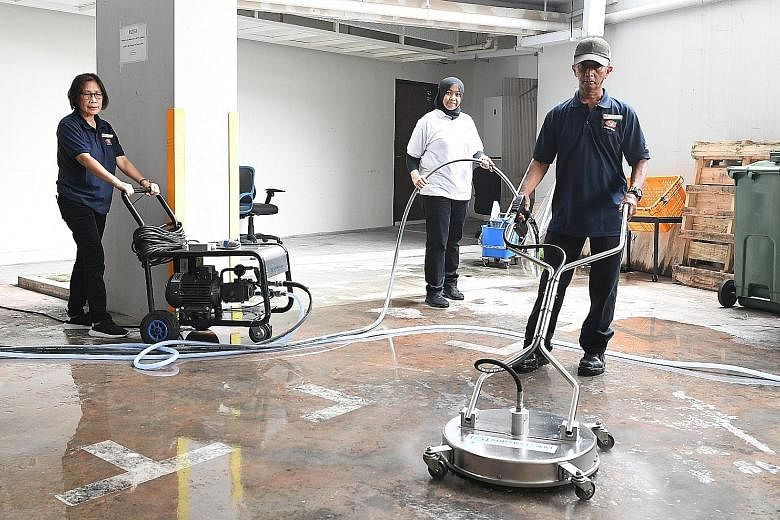Cleaners here will receive an annual bonus of at least two weeks' pay from Jan 1, 2020, which must be paid even if they should retire, contract an illness or are affected by contractual changes.
The compulsory bonus, details of which were released yesterday by the Tripartite Cluster for Cleaners (TCC), applies to cleaners who are Singaporeans and permanent residents who have worked at least a year in the same company.
The TCC report also set out the exact quantum, timeline and scenarios for all resident cleaners to be paid the bonus.
The bonus, which is part of the sector's progressive wage model (PWM), was first mooted in December 2016 as part of a national effort to raise wages and encourage skills upgrading in the cleaning industry, and was passed in Parliament last month in an amendment to the Environmental Public Health Act.
It is expected to benefit more than 40,000 cleaners employed by over 1,300 cleaning firms here.
The bonus will serve as "a retention tool to motivate cleaners to stay with the same employer longer for better career progression", said the TCC. The bonus will also encourage businesses to raise worker productivity by investing in training, it added.
Part-time and relief cleaning workers who are employed on an ad hoc basis must also be paid a bonus that is pro-rated to the contractual hours they worked that year, as long as they meet the 12-month service length in that same firm.
But as some clients can change their cleaning service providers frequently, there was concern that some cleaners may not be able to reach the required term of service to qualify for the bonus through no fault of their own.
To address this, the TCC said employers must still pay the bonus to workers who do not meet the service length criteria in such cases.
The bonus must still be paid if the workers retire or cannot work because of a medical issue. If workers resign or their services are terminated due to misconduct, then no PWM bonus is necessary.
The bonus is not tied to a worker's performance, but the TCC noted that some cleaning firms already provide some form of variable staff bonus such as ones tied to performance or 13th-month payouts. Overtime pay and reimbursements are not considered bonuses.
Firms that already pay these bonus payments to cleaning staff would be deemed as having complied with the PWM bonus requirements if they are already giving out more than the minimum two weeks of the worker's basic wage. Besides the bonus, the TCC also recommended scheduled wage increases of 3 per cent annually to the PWM wage levels from 2020 to 2022.
For instance, general cleaners working in offices and food and beverage establishments who are on a minimum wage of $1,200 a month next year will see their pay rise by $36 in 2020.
Employers must comply with these requirements to attain the business licence needed to operate in the cleaning industry.
The Government has accepted the TCC recommendations, the Manpower Ministry and the National Environment Agency said in a joint statement.
National Trades Union Congress assistant secretary-general Zainal Sapari said the PWM, introduced in 2012, was to grow wages in a sustainable way and address cheap sourcing, which he called a form of market failure.
"The PWM recognises that there is no shortcut to helping low-wage workers move up. To progress, they must have opportunities to acquire skills, be assigned work that makes use of those skills and be paid accordingly for the improved productivity," said Mr Zainal, who is also a member of the TCC.
"It is different from minimum wage on a number of fronts - it is a ladder and not a floor, so every worker has a chance to progress."
A combination of the progressive wage model and company policies saw cleaner Ang See Gee's monthly wages climb from $900 in 2007 to $1,400 in 2013. She is now paid around $1,700 a month, after going through skills training that helped her to become a supervisor in her firm, Sun City Maintenance, last year.
A PWM bonus would mean around $850 in additional spending money each year.
Madam Ang, 57, said in Mandarin: "The pay was worse in the past, and right now, it is quite manageable for my needs. If I need extra, I can always work overtime."


